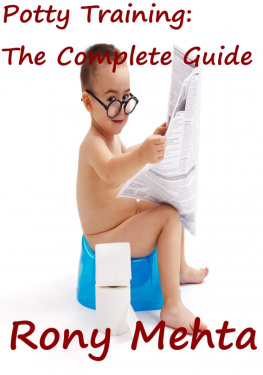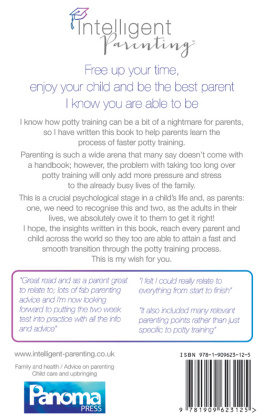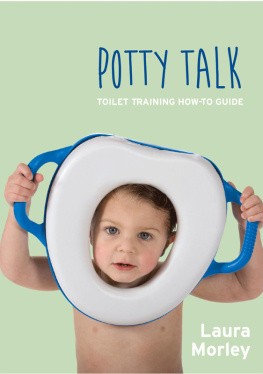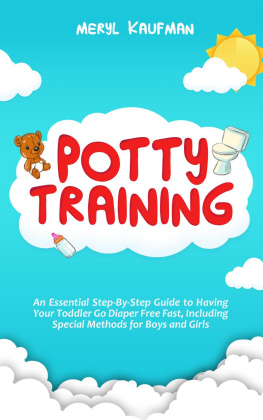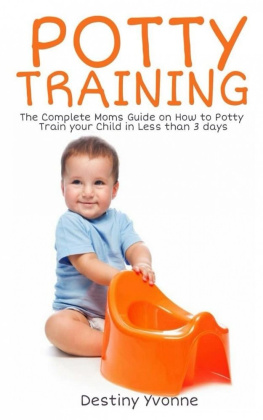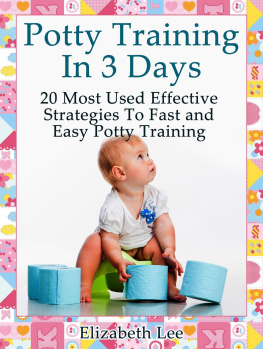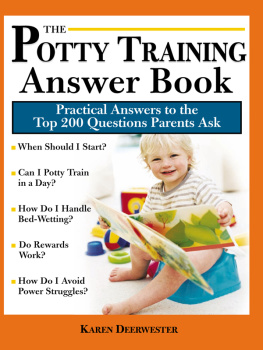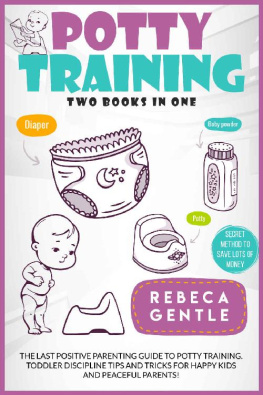Potty Training: The Complete Guide
Copyright[2015][Rony Mehta]
Published by Rony Mehta at Smashwords
Preface
As humans there are a few actions whichare a part and parcel of our day to day routine, actions that keepus alive, actions that keep us up and moving. If I ask a bunch ofpeople to name a few such actions, in all likelihood, the mostprobable answers will be, eating, sleeping, breathing, drinkingwater, sexual needs for adults etc, but somewhere most of us tendto miss a very important action, excretion. As adults, we oftenteach our kids good dining habits and lessons on how to behave infront of other people, however; as funny as it may sound, asparents we resist talking about potty training of children,probably because people believe the topic to be an embarrassing andunpleasant one. From the studies that I have down of cultures andpeoples behavior all around the globe, there is a huge differencein mentality regarding topics such as toilet training.
Potty training in earlierdays
There is no doubt that diaper hasalways been a controlling material in the toilet training scene,however; the material used for diapers has changed significantlyover the course of time. Historically, diapers were made in homeswith the help of cloth, preferably cotton or linen material. Sincethese materials did not soak in fluid, the urgency to get childrenout of the diaper was of utmost priority. The invention and theescalated use of super soaking plastic diapers have made lifeeasier for parents and kids too to some extent. However; on theflip side of the coin, the use of super soaking diapers has alsomade potty training lose its importance. Further, children usingthe plastic diapers, rely on them for a very long time which is notparticularly an ideal situation. Still in certain parts of theworld, cotton diapers are prioritized over the super soaking onesand potty training in such areas comes automatically.
Potty training in different parts of theworld
I believe that if you are a person fromAfrica or Asia and if you come across people talking about the needof potty training kids, it is highly likely that you will laugh offto the suggestion. The reason is the obvious one, women in Asianand African countries keep their young babies very close to theirbodies and often carry them in their arms, therefore, in case ofsuch close proximity the symptoms of babies wanting to relievethemselves come instinctively to them. On the other hand, mothersin countries like United States and Canada tend to carry theiryoung babies in baby carriers and therefore the need and importanceof toilet training becomes all the more important. In countriessuch as Germany, India and other parts of Europe, Africa and Asia,potty training starts from a very early age and the kid does notneed diapers by the time he becomes 2-3 years. Particularly in Asiawhere potty training is an important aspect of personal hygiene,even for young babies, mothers prepare their kids for peeing or forbowel exercise by making noise like Psshhhhhh from their mouths.The kid gets used to the sound after a while and realizes himselfthat it means that he needs to excrete. Thus, in cultures whereparents tend to keep their babies close to their bodies, the pottytraining starts from a very early age and in the starting its theparent who is the primary focus of the training exercise as theyare the ones expecting to read signs from their kids. Though pottytraining of kids in these cultures take a little bit of time,however; it is very effective and has a long lasting effect on thebaby. In some parts of Asia, the use of cotton cloth is done tomake diapers for toddlers, instead of using the super absorbingdiapers. Therefore, the parent learns about the kids pottyexercise much easily as the toddler shows signs of discomfort.Parents who use diaper free method are dedicated to follow it asthe health of their kids are at stake and quite clearly it issomething that every parent can follow if they want to.
The stats will give you a clearerpicture about the condition of potty training in USA and Canada.About 50% of Worlds population is potty trained by the time theylive the first 12 months of their lives and many of these 50% arepotty trained as early as 6 months. Almost all the remainingpopulation is potty trained by the time they reach the age of 2years. However, the figures in USA are contrasting, in USA; most ofthe children are not potty trained even after they reach the 35-40months mark. In fact, the figures are more or less the same inother affluent and developed nations with a high growth rate. So,what is it then, is it the culture or the development that isrestricting potty training among parents? And if its thedevelopment, then is it not a move in the wrong direction with kidsnot potty trained even after they start going to theirschools.
Certainly, there are a few factors thathad led to the increased time span that potty training routine istaking in countries such as USA and Canada, but the one fact isthat the trend is worrisome and needs to be improved. In fact,other specialists in child health have also taken notice of thisdata and have published reports and proposals to reverse it. We ashuman beings are made to be self dependent and our kids mustrealize it as soon as possible, only a jeweler knows the true worthof gold, same way only the one, who owns it, knows the right way totreat his body.
Why is potty trainingnecessary?
Now I know a lot of people believe thatIts not mathematics, it is just potty training, the kids willlearn on their own and they can back their opinion saying that Noone graduates from high school in diapers, so no need to force iton it. This is exactly where people get it wrong. As parents youare not, and must not force your kids, rather parents must createan environment where the kid is motivated to learn pottytraining.
Health and Hygiene
The most important reason why pottytraining is necessary and unavoidable is because of its closerelation with the health and hygiene of an individual. The toxicwastes in the body are removed by the process of excretion and themore swift and regular this process is, the better it is for thebody. Further, since its wastes, the body must let go of them in aproper and hygienic manner as well.
It is easier, less expensive, and a lotless stressful to potty train a child before the age of 2 years.Before 24 months, a childs grasping power is very high and the kidis always eager and enthusiastic to learn and he/she is dependentupon the parents or the primary caretaker to help in the learningprocess. However, as soon as the kid reaches the 30 month mark, hestarts exploring more and it becomes difficult to teach him afterthis point. So, the earlier you potty train your kid, the betterand easier it is for you.
Independence in school
Quite a few parents around the globepotty train their kids at a very early age because they do not wanttheir ward to depend upon the caretaker in the school or teachersand cause inconvenience to them. It also affects the level ofeducation if the teacher is busy changing diapers in the class.Further, kids who come to school having the basic potty trainingserve as example and copycat models for others in the class. Notonly in the school, imagine you go for a social gathering, alldressed up and your kid has bowel troubles at the party. It will bevery unhygienic and clumsy, both for you and the kid. The bestoption in such a situation is if the kid can take care of his/herown potty routine, something that can only come from pottytraining.
Letting your kid fly
Imagine your hands or feet clamped withshackles and you are asked to do your daily routine. Or to be morerealistic, imagine being in your formal office attire for the wholeday, while you sleep, while you eat, while your go for a jog,needless to mention that you will be frustrated and irritated ifsomething like that happens to you. Your kid in diapers for thewhole day feels the same way. Potty training your kid at an earlyage allows him to be free and enjoy. Everyone loves a cheerful andhappy kid and no parent wants to see his/her kid uncomfortable. So,its better to start potty training at an early age and keepdiapers for the extreme situations.
Next page
